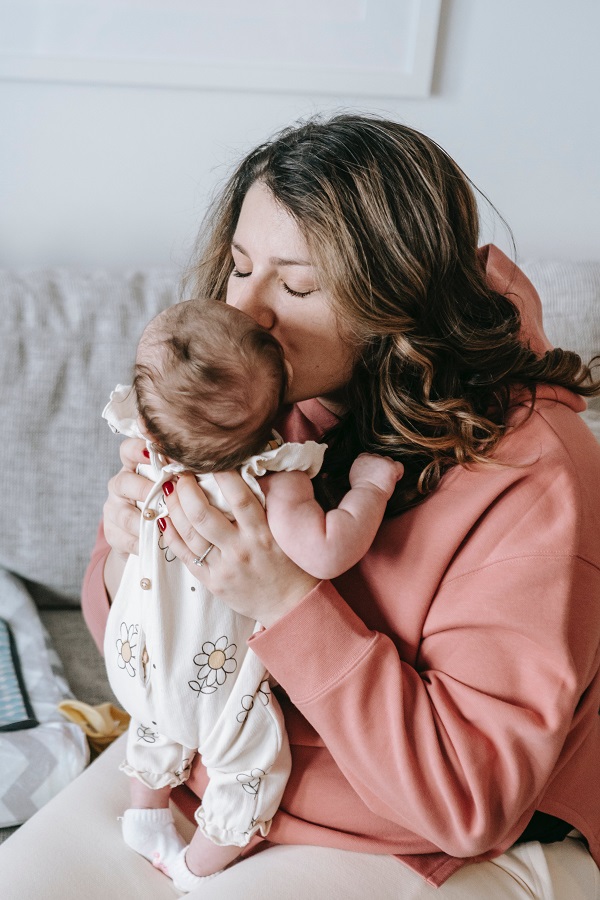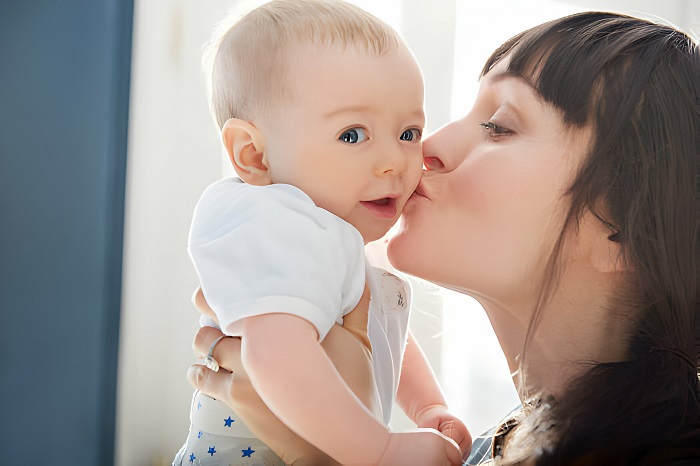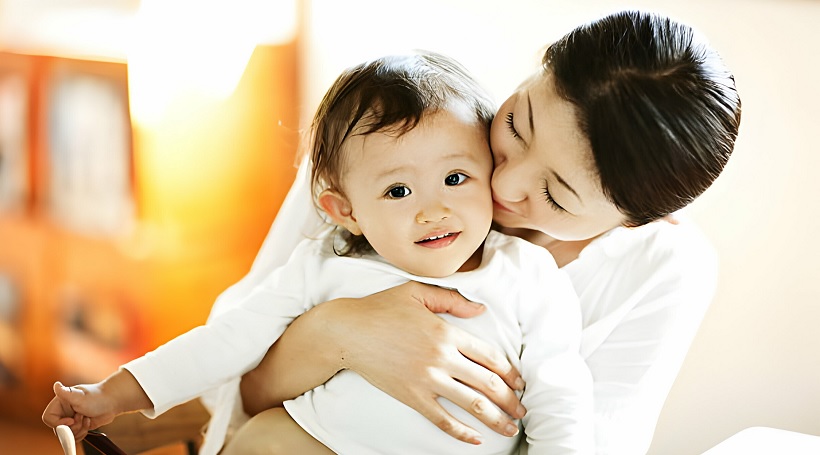Yes, it is safe for a mother to kiss her baby, as it helps to build a strong emotional bond and boost the baby’s immune system. Kissing releases oxytocin, a hormone that promotes bonding and reduces stress in both the mother and the baby, while also passing on antibodies through skin-to-skin contact.
Additionally, the act of kissing assists in the regulation of the baby’s body temperature and heart rate. However, it is important to practice good hygiene by ensuring the mother has no contagious cold sores or infections before kissing the baby to prevent the spread of any potential illnesses.
Regular hand-washing and maintaining good overall health are key to safeguarding the well-being of both the mother and the baby.

Germs And Transmission
Germ transmission is a topic of great concern for new mothers. Understanding how germs are spread is essential in ensuring the safety and well-being of a baby. In this post, we will delve into what germs are and how they are transmitted.
Read More – How To Deal With Wife And Mother In Law Issues?
What Are Germs?
Germs are microscopic organisms that can cause diseases. They can be bacteria, viruses, fungi, or parasites. While some germs are harmless, others can be dangerous and lead to infections. It is important to note that not all germs are bad. Exposure to some germs can strengthen a baby’s immune system. However, it is crucial to maintain good hygiene practices to prevent the spread of harmful germs.
How Are Germs Transmitted?
Germs can be transmitted in several ways. Understanding these modes of transmission can help mothers minimize the risk of exposing their babies to harmful germs. Here are some common routes of germ transmission:
- Direct contact: Germs can be transmitted through direct contact with an infected person or surface. For example, kissing a baby with a cold sore can transmit the herpes simplex virus.
- Airborne transmission: Some germs can spread through the air when an infected person coughs, sneezes, or talks. Inhaling these germs can lead to respiratory infections.
- Fecal-oral transmission: Germs in feces can contaminate hands, objects, or surfaces. Touching these contaminated surfaces and then touching the mouth or face can result in infections.
- Vector-borne transmission: Certain insects or animals can carry and transmit germs. For instance, mosquitoes can transmit diseases like malaria or dengue fever.
Understanding how germs are transmitted gives mothers the knowledge they need to protect their babies. By practicing good hygiene, such as washing hands regularly, disinfecting surfaces, and avoiding close contact with sick people, the risk of germ transmission can be significantly reduced.
Benefits Of Maternal Affection
Kissing is a natural display of affection that is often observed between mothers and their babies. This act goes beyond just a simple expression of love, as it also comes with a range of physical and emotional benefits for the baby. Understanding these benefits can shed light on the importance of maternal affection in the development and well-being of a child.
Emotional Bonding
Babies rely on close physical contact such as kissing to develop a strong emotional bond with their mothers. This bond is crucial for a baby’s overall emotional, social, and psychological development.
Boost In Immune System
Mother’s kisses can benefit a baby’s immune system. By sharing the same bacteria, the mother’s saliva can help the baby’s body build a stronger defense against harmful pathogens.
Stress Relief
When a mother kisses her baby, it triggers the release of oxytocin, the hormone responsible for reducing stress and promoting relaxation in both the mother and the baby. This can have a calming effect, promoting a feeling of security and comfort for the baby.
Precautions For A Mother’s Kiss

When it comes to the bond between a mother and her baby, kisses are a natural expression of love and affection. However, there are certain precautions that a mother should take to ensure the safety and well-being of her little one. It’s important to be aware of the potential risks and take necessary steps to mitigate them.
Avoid Kissing If You Are Sick
If you are feeling unwell or experiencing symptoms of illness, it’s best to avoid kissing your baby. Even seemingly minor illnesses like a cold or a cold sore can pose a risk to your baby’s delicate immune system.
Maintain Good Hygiene Practices
Mothers must practice good hygiene when interacting with their babies. This includes regular hand washing, especially before feeding or handling the baby, and keeping the baby’s face clean to reduce the risk of spreading germs through kisses.
Be Aware Of Potential Risks
Being aware of potential risks is essential in safeguarding your baby’s health. For instance, kissing your baby in the mouth can transfer bacteria that may lead to infections. Additionally, being cautious around newborns is important as their immune systems are still developing.
Read More – How To Deal With Parents With Anger Issues?
Expert Opinions And Research
Experts and research suggest that kissing your baby is generally safe, as long as you take precautions to maintain good hygiene and health habits. However, it is essential to be mindful of the risks of transmitting certain illnesses and infections through close contact, especially during times of sickness.
Medical Professionals’ Views
Medical professionals universally recommend and encourage the act of a mother kissing her baby. Their consensus arises from the fact that physical affection and bonding are vital for the overall well-being of infants.
Kissing offers various benefits, including:
- Promoting emotional development and attachmentBoosting the immune system
- Facilitating the release of oxytocin, the “love hormone,” which aids in bondingEnhancing a baby’s sense of security and comfort
- Stimulating the release of endorphins, providing pain relief and promoting relaxation
Given these advantages, it is clear that a mother’s kiss is not only safe but highly beneficial for her baby’s development.
Studies On Mother-to-baby Transmission
Multiple studies have examined the risk of transmitting illnesses or infections from a mother to her baby through kissing. These studies, including those related to viruses such as the Herpes Simplex Virus (HSV), conclude that the risk of transmission is generally low.
Research has indicated that transmission of diseases like HSV-1 and HSV-2 is unlikely if the mother is not experiencing an active outbreak or has any visible sores or lesions on her mouth. Mothers must practice good hygiene by washing their hands regularly and avoiding kissing their babies when they have a cold sore or any visible signs of illness.
Read More – Pros And Cons Of Living With Mother In Law
Frequently Asked Questions Of Is It Safe For A Mother To Kiss Her Baby?
Can A Mother’s Kiss Be Harmful To Her Baby?
Not! A mother’s kiss is perfectly safe and offers many benefits, including emotional bonding and boosting the baby’s immune system.
Is It Possible For A Baby To Catch Diseases From A Mother’s Kiss?
It is highly unlikely for a baby to catch diseases from a mother’s kiss. A mother’s kiss poses minimal risk and can transfer beneficial bacteria.
Are There Any Precautions A Mother Should Take Before Kissing Her Baby?
While there are no strict precautions, mothers should maintain good oral hygiene and be mindful of any contagious mouth conditions before kissing their baby.
Should A Mother Avoid Kissing Her Baby If She Has A Cold Sore?
If a mother has a cold sore, it is recommended to avoid kissing her baby until the sore has healed completely to prevent potential transmission of the virus.
Can A Mother’s Kiss Protect Her Baby From Future Allergies?
Yes, studies suggest that a mother’s kiss can transfer important microorganisms to the baby, which may help develop a strong immune system and reduce the risk of allergies in the future.
Conclusion
Kissing your baby is generally safe and beneficial for both mother and child. It helps establish a bond, boosts their immune system, and promotes emotional well-being. However, certain precautions must be taken to ensure the baby’s health, such as maintaining good oral hygiene and avoiding kissing when either the mother or baby is sick.
Ultimately, while affectionate gestures like kissing are encouraged, it’s important to prioritize the baby’s well-being above all else.







